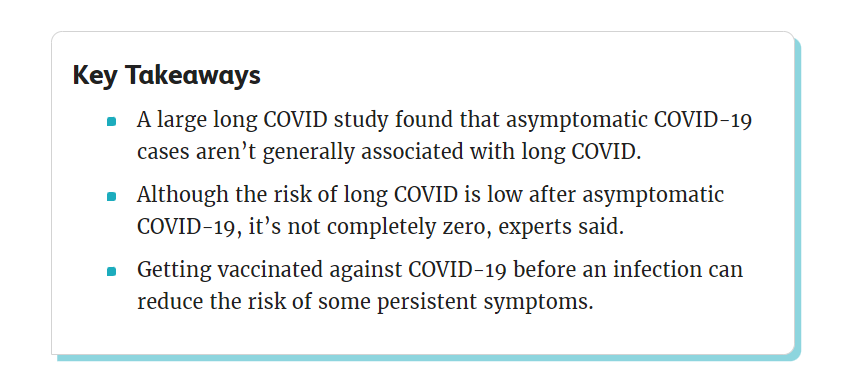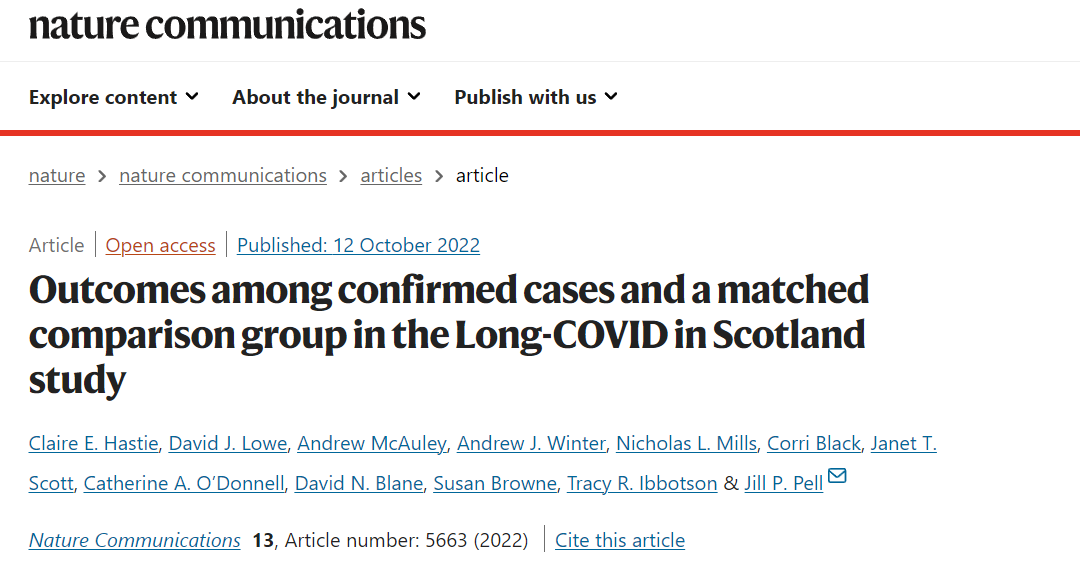General Discussion
Related: Editorials & Other Articles, Issue Forums, Alliance Forums, Region ForumsNeighbor with possible long term COVID, but never had COVID.
A neighbor of mine flew overseas last year. When he came back, he had a slight cough (throat clearing) and was miserably tired. Doctors have been unable to find the cause after about a year.
Their latest guess is that it's long term COVID. However, he's never had COVID.
Is it possible to get COVID, not know it, and then have long term COVID? He WAS on a plane, so that guess by the doctors makes sense.
DET
(1,393 posts)Long term Covid bears a remarkable resemblance to what used to be called Chronic Fatigue Syndrome (now renamed). CFS was dismissed for a long time as a psychological problem of hysterical women (see Incline Village 1984 outbreak - thanks, CDC). It is now generally recognized (except by many still ignorant doctors) that CFS usually presents after a significant viral infection, especially mononucleosis. Nobody knows the exact mechanisms involved - largely because they were not investigated until recently.
I suspect that long term Covid is a much more visible example of the debilitating effects of a post viral syndrome like CFS. The medical community is finally being forced to deal with this problem because of its prevalence and worldwide impact following Covid. Sadly, we lost four decades of potential research into this illness because of medical arrogance and misogyny.
I don’t know what caused your neighbor’s health problems, but it wouldn’t surprise me at all if he caught some kind of viral illness that resulted in his current long term symptoms. Unfortunately, currently available tests probably won’t reveal much. Which, to many doctors, means ‘Deal with it. You’re fine!’
C Moon
(12,254 posts)I believe you are spot on about the long term COVID thing being related. Not sure about my neighbor, but that’s a definite possibility. Thx!
Hekate
(91,687 posts)Women were treated horribly over CFS. It's also my personal opinion that treatment prevented symptomatic men from coming forward.
Indeed, decades of lost research
Crunchy Frog
(26,753 posts)if your symptoms are relatively minor and you don't get tested, you may assume you didn't have it. And yes, it can still lead to long Covid.
C Moon
(12,254 posts)electric_blue68
(15,400 posts)Celerity
(44,538 posts)
Yes, it's possible for anyone who contracted COVID-19 to experience a wide range of ongoing health problems as a result of their infection, even those who did not experience any symptoms or had a mild illness. However, experts say this phenomenon, known as long COVID, tends to occur more often among individuals who had a severe illness.
There is still much to know about the mechanism of long COVID, but further research is expected to shed more light on the matter.
One of the largest long COVID studies to date recently reported that asymptomatic SARS-CoV-2 infections are generally not linked to long COVID. To determine the frequency, nature, and impact of long COVID in the general population, the researchers studied more than 33,000 confirmed cases of COVID-19 with almost 63,000 never-infected individuals and conducted regular follow-ups. Their findings are published in Nature Communications.
Although it may be reassuring that the study did not find asymptomatic infections to be associated with any long-term health impacts, experts said you're not totally out of the woods if you had no symptoms.

https://www.nature.com/articles/s41467-022-33415-5
Abstract
With increasing numbers infected by SARS-CoV-2, understanding long-COVID is essential to inform health and social care support. A Scottish population cohort of 33,281 laboratory-confirmed SARS-CoV-2 infections and 62,957 never-infected individuals were followed-up via 6, 12 and 18-month questionnaires and linkage to hospitalization and death records. Of the 31,486 symptomatic infections,1,856 (6%) had not recovered and 13,350 (42%) only partially. No recovery was associated with hospitalized infection, age, female sex, deprivation, respiratory disease, depression and multimorbidity. Previous symptomatic infection was associated with poorer quality of life, impairment across all daily activities and 24 persistent symptoms including breathlessness (OR 3.43, 95% CI 3.29–3.58), palpitations (OR 2.51, OR 2.36–2.66), chest pain (OR 2.09, 95% CI 1.96–2.23), and confusion (OR 2.92, 95% CI 2.78–3.07). Asymptomatic infection was not associated with adverse outcomes. Vaccination was associated with reduced risk of seven symptoms. Here we describe the nature of long-COVID and the factors associated with it.
Introduction
Whilst most people recover fully from severe acute respiratory syndrome coronavirus-2 (SARS-CoV-2) infection, some develop long-COVID. With increasing numbers of people having been infected since the start of the pandemic, attention is shifting from managing the acute infection to understanding long-COVID in order to inform the health and social care response. The WHO defined long-COVID as “a history of probable or confirmed SARS-CoV-2 infection … with symptoms that last for at least 2 months and cannot be explained by an alternative diagnosis”1. The imprecision of this, and other, definitions reflects our poor understanding of the nature of long-COVID and its underlying mechanisms.
A meta-analysis of 63 studies pooled symptom prevalence following laboratory-confirmed SARS-CoV-2 infection2. The sample size ranged from 58 to 1733 (16,336 in total), with most studies containing fewer than 200 participants. Overall, 53% of people reported one or more symptoms beyond 12 weeks following infection. The most common were fatigue, pain/discomfort, shortness of breath, cognitive impairment, and mental health problems. Eighteen studies were judged to be at high risk of bias, and the remaining 45 were at moderate risk, due to convenience sampling and unrepresentative study populations. Half of the studies investigated hospitalised cohorts. The only two studies with more than 1000 participants were a hospitalised cohort and a cohort of health-care workers with mild infection. In a subsequent meta-analysis of 18 studies with at least 12 months follow-up, study samples ranged from 51 to 2433 (8591 in total) and 28% of participants reported fatigue/weakness, 22% anxiety, 18% breathlessness, 19% memory loss, 18% concentration difficulties and 12% insomnia3. The authors highlighted a small sample size, lack of representativeness and low response rate as limitations. Whilst many long-COVID studies have focused on patients hospitalised with more severe infections, a meta-analysis of 9 studies reported persistent symptoms in up to one-third of people following mild SARS-CoV-2 infection4.
This study aimed to address some of the limitations of existing studies by determining the frequency, nature, determinants and impact of long-COVID in the general population using a largescale, nationwide study, including people who had severe, mild and asymptomatic infections and a never infected comparison group, and measuring serial self-reported outcomes as well as outcomes obtained from linkage to routine health records. Here we show that the long-term sequelae of COVID-19 are wide-ranging and impact on all aspects of daily living, are specific to symptomatic infections and more likely following severe infections requiring hospitalisation, and in older, female and more deprived patients with pre-existing health problems but vaccination appears to confer some protection.
Results.......
snip